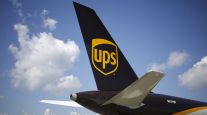LTL Boosts UPS’ 2Q Results; Firm Warns on Rest of 2012
This story appears in the July 30 print edition of Transport Topics.
UPS Inc. raised second-quarter earnings to $1.12 billion, with help from its less-than-truckload unit, but the biggest parcel and freight carrier warned that its second-half profit will be diminished by a weakening U.S. economy.
UPS, Atlanta, announced on July 24 that net income rose 2.2% from $1.09 billion as revenue increased 1.2% to $13.3 billion. The UPS Freight LTL unit posted what Chief Financial Officer Kurt Kuehn said was “mid-single-digit” profit that bettered the second-quarter 2011 results.
At the same time, however, CEO Scott Davis said the results in the upcoming quarters will be depressed by an economy that UPS believes will grow just 1% for the balance of the year. That pace, slower than first-half gross domestic product growth, prompted UPS to reduce its full-year profit forecast by about 6%.
“Increasing uncertainty in the United States, continuing weakness in Asia exports and the debt crisis in Europe are impacting projections of economic expansion,” Davis said.
A particular concern, he said, was the federal government’s so-called “fiscal cliff” that could be triggered by budget cuts and potential tax increases if Congress fails to adjust U.S. spending policy by year-end.
“As we get closer to the ‘fiscal cliff,’ there is more uncertainty than ever,” said Davis, particularly among small businesses that are reluctant to invest and hire.
At the same time, he noted, retail sales are trending down for the first time since the recession year of 2009, indicating consumer uneasiness and manufacturing activity is slowing.
The results raised concern on Wall Street.
“The most important take-away from [bellwether] UPS’s results was the company’s comments about small and midsize customers who are paralyzed by the amount of policy uncertainty,” said Credit Suisse analyst Chris Ceraso. “This is the clearest evidence yet — from one of the largest companies — that second-half domestic activity is at risk from policy paralysis.”
“The report generally raises some worrisome data points about the broader economy,” said Peter Nesvold, a Jefferies & Co. analyst.
Kuehn emphasized that UPS, which ranks No. 1 on Transport Topics Top 100 list of the largest U.S. and Canadian for-hire carriers, believes that second-quarter results were “solid” despite the weakening U.S. and global economies.
UPS Freight raised LTL revenue 0.8% to $597 million. Kuehn didn’t give a precise percentage increase for the LTL carrier’s operating income, which excludes taxes and interest, for either quarter.
He did say UPS was “very pleased by the productivity” at the Freight unit and that the LTL business was “fairly disciplined on pricing and volume.”
Balanced against the revenue increase was a 1.9% drop in LTL tonnage handled and a 2.9% decline in shipments. Revenue per 100 pounds of freight was $21.50, a 2.8% increase that reflected higher overall rates.
Kuehn also commented favorably on the U.S. package business, saying that unit had “a good quarter.”
The domestic business raised revenue 4.1% to $8.06 billion and added 14% to operating profit, which totaled $1.13 billion. Package volume increased 3.5%.
Increased shipments from businesses to consumers triggered the improvement, he said, while business-to-business shipments languished.
On the international side, revenue and profitability slipped, against the backdrop of weaker Asian business and the European financial crisis. Davis said UPS is scaling back its Asian freight business to counteract the decline.
International revenue was 4.0% lower at $3.01 billion, and operating income was off 10% at $454.0 million.
A key factor at domestic and international units was the customers’ eagerness to “trade down” to lower-cost shipping options, such as deferred package delivery, Davis and Kuehn said.
For the second half of the year, Kuehn projected a 1% to 2% rise in revenue at the domestic package business from the year-earlier period, with profit margins expected to trail the second half of last year.
International results are expected to improve in the second half, relative to last year, when that market was even weaker, Kuehn said.
Davis also commented on the beginning of contract talks between UPS and the Teamsters union in September, saying that the talks should be helped by the fact that “all the issues impacting the Teamsters are on the table already.”
The current contract expires in July 2013.
While Davis said UPS has been in regular contact with the union to discuss business issues, he didn’t specify what those issues were.
“We expect to get things favorably resolved,” Kuehn said.




